https://unionist.com/blogs/news/this-week-in-labor-history-march-5-11
March 05
 British soldiers, quartered in the homes of colonists, took the jobs of working people when jobs were scarce. On this date, grievances of rope makers against the soldiers led to a fight. Soldiers shot down Crispus Attucks, a Black colonist, then others, in what became known as the Boston Massacre. Attucks is considered the first casualty in the American Revolution – 1770
British soldiers, quartered in the homes of colonists, took the jobs of working people when jobs were scarce. On this date, grievances of rope makers against the soldiers led to a fight. Soldiers shot down Crispus Attucks, a Black colonist, then others, in what became known as the Boston Massacre. Attucks is considered the first casualty in the American Revolution – 1770
United Shoe Workers of America merge with Amalgamated Clothing & Textile Workers Union – 1979
March 06
The Sailors’ Union of the Pacific, a union of mariners, fishermen and boatmen working aboard U.S. flag vessels, is founded in San Francisco – 1885
The Knights of Labor picket to protest the practices of the Southwestern Railroad system, and the company’s chief, high-flying Wall Street financier Jay Gould. Some 9,000 workers walked off the job, halting service on 5,000 miles of track. The workers held out for two months, many suffering from hunger, before they finally returned to work – 1886
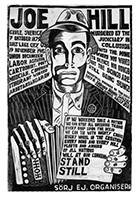 Joe Hill’s song “There is Power in a Union” appears in Little Red Song Book, published by the Wobblies – 1913
Joe Hill’s song “There is Power in a Union” appears in Little Red Song Book, published by the Wobblies – 1913
With the Great Depression underway, hundreds of thousands of unemployed workers demonstrated in some 30 cities and towns; close to 100,000 filled Union Square in New York City and were attacked by mounted police – 1930
Int’l Brotherhood of Paper Makers merges with United Paperworkers of America to become United Papermakers & Paperworkers – 1957
The federal Coal Mine Health and Safety Act is enacted – 1970
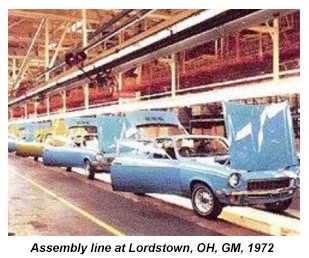 Predominantly young workers at a Lordstown, Ohio, GM assembly plant stage a wildcat strike, largely in objection to the grueling work pace: at 101.6 cars per hour, their assembly line was believed to be the fastest in the world – 1972
Predominantly young workers at a Lordstown, Ohio, GM assembly plant stage a wildcat strike, largely in objection to the grueling work pace: at 101.6 cars per hour, their assembly line was believed to be the fastest in the world – 1972
President Jimmy Carter invoked the Taft-Hartley law to halt the 1977-78 national contract strike by the United Mine Workers of America. The order was ignored and Carter did little to enforce it. A settlement was reached in late March – 1978
The U.S. Department of Labor reports that the nation’s unemployment rate soared to 8.1 percent in February, the highest since late 1983, as cost-cutting employers slashed 651,000 jobs amid a deepening recession – 2009
March 07
Some 6,000 shoemakers, joined by about 20,000 other workers, strike in Lynn, Mass. They won raises, but not recognition of their union – 1860
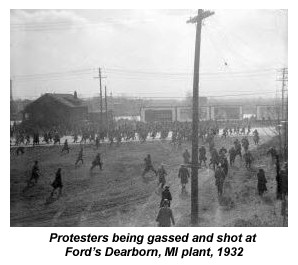 Three thousand unemployed auto workers, led by the Communist Party of America, braved the cold in Dearborn, Mich., to demand jobs and relief from Henry Ford. The marchers got too close to the gate and were gassed. After re-grouping, they were sprayed with water and shot at. Four men died immediately; 60 were wounded – 1932
Three thousand unemployed auto workers, led by the Communist Party of America, braved the cold in Dearborn, Mich., to demand jobs and relief from Henry Ford. The marchers got too close to the gate and were gassed. After re-grouping, they were sprayed with water and shot at. Four men died immediately; 60 were wounded – 1932
Steel Workers Organizing Committee—soon to become the United Steel Workers—signs its first-ever contract, with Carnegie-Illinois, for $5 a day in wages, benefits – 1937
IWW founder and labor organizer Lucy Parsons dies – 1942
Hollywood writers represented by the Writers Guild of America strike against 200 television and movie studios over residuals payments and creative rights. The successful strike lasted 150 days, one of the longest in industry history – 1988
Musicians strike Broadway musicals and shows go dark when actors and stagehands honor picket lines. The strike was resolved after four days – 2003
March 08
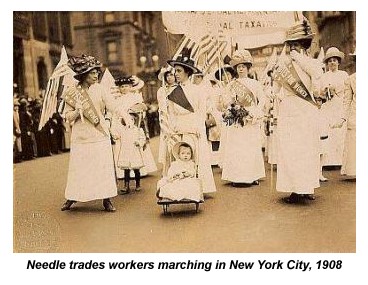 Thousands of New York needle trades workers demonstrate for higher wages, shorter workday, and end to child labor. The demonstration became the basis for International Women’s Day – 1908
Thousands of New York needle trades workers demonstrate for higher wages, shorter workday, and end to child labor. The demonstration became the basis for International Women’s Day – 1908
Three explosions at a Utah Fuel Co. mine in Castle Gate, Utah, kill 171. Fifty of the fatalities were native-born Greeks, 25 were Italians, 32 English or Scots, 12 Welsh, four Japanese, and three Austrians (or South Slavs). The youngest victim was 15; the oldest, 73 – 1924
New York members of the Fur and Leather Workers Union, many of them women, strike for better pay and conditions. They persevere despite beatings by police, winning a 10-percent wage increase and five-day work week – 1926
The Norris-LaGuardia Anti-Injunction Act took effect on this day. It limits the ability of federal judges to issue injunctions against workers and unions involved in labor disputes – 1932
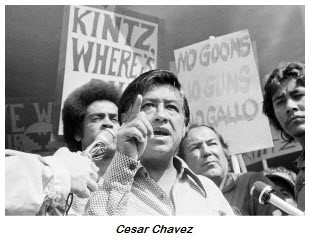 César Chávez leads 5,000 striking farmworkers on a march through the streets of Salinas, Calif. – 1979
César Chávez leads 5,000 striking farmworkers on a march through the streets of Salinas, Calif. – 1979
March 09
The Westmoreland County (Pa.) Coal Strike—known as the “Slovak strike” because some 70 percent of the 15,000 strikers were Slovakian immigrants—begins on this date and continues for nearly 16 months before ending in defeat. Sixteen miners and family members were killed during the strike – 1912
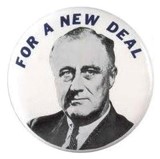 Spurred by President Franklin D. Roosevelt, the U.S. Congress begins its 100 days of enacting New Deal legislation. Just one of many programs established to help Americans survive the Great Depression: The Civilian Conservation Corps, which put 2.5 million young men on the government payroll to help in national conservation and infrastructure projects – 1933
Spurred by President Franklin D. Roosevelt, the U.S. Congress begins its 100 days of enacting New Deal legislation. Just one of many programs established to help Americans survive the Great Depression: The Civilian Conservation Corps, which put 2.5 million young men on the government payroll to help in national conservation and infrastructure projects – 1933
Work begins on the $8 billion, 800-mile-long Alaska Oil pipeline connecting oil fields in northern Alaska to the sea port at Valdez. Tens of thousands of people worked on the pipeline, enduring long hours, cold temperatures and brutal conditions. At least 32 died on the job – 1974
March 10
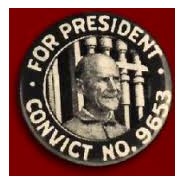 U.S. Supreme Court upholds espionage conviction of labor leader and socialist Eugene V. Debs. Debs was jailed for speaking out against World War I. Campaigning for president from his Atlanta jail cell, he won 3.4 percent of the vote—nearly a million votes – 1919
U.S. Supreme Court upholds espionage conviction of labor leader and socialist Eugene V. Debs. Debs was jailed for speaking out against World War I. Campaigning for president from his Atlanta jail cell, he won 3.4 percent of the vote—nearly a million votes – 1919
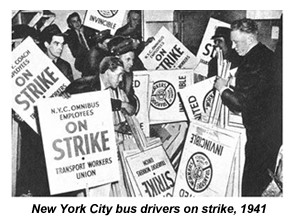 New York City bus drivers, members of the Transport Workers Union, go on strike. After 12 days of nobuses—and a large show of force by Irish-American strikers at the St. Patrick’s Day parade—Mayor Fiorello La Guardia orders arbitration – 1941
New York City bus drivers, members of the Transport Workers Union, go on strike. After 12 days of nobuses—and a large show of force by Irish-American strikers at the St. Patrick’s Day parade—Mayor Fiorello La Guardia orders arbitration – 1941
United Farm Workers leader César Chávez breaks a 24-day fast, by doctor’s order, at a mass in Delano, California’s public park. Several thousand supporters are at his side, including Sen. Robert Kennedy. Chavez called it “a fast for non-violence and a call to sacrifice” – 1968
March 11
 Luddites smash 63 “labor saving” textile machines near Nottingham, England – 1811
Luddites smash 63 “labor saving” textile machines near Nottingham, England – 1811
Transport Workers Union members at American Airlines win 11-day national strike, gaining what the union says was the first severance pay clause in industry – 1950
—Compiled and edited by David Prosten
